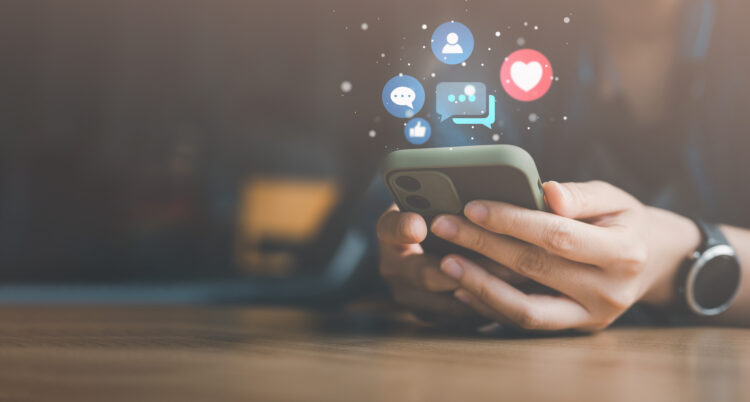Maybe you shared a meme today. Or maybe you reposted a funny one-liner you came across. Perhaps you scrolled through the photos from a friend’s big event. You might have clicked on a news story or two, commented on a friend’s post (or just used the “care” response), and watched a video from your favorite comedian. And of course, you may have posted to any of a number of social media sites, sharing your thoughts with your friends and followers. You may be checking back regularly to see how many people have interacted with your post.
Social media is nearly inescapable these days. And in some ways, that is a good thing. Social media users can reconnect with old friends or with family members scattered far and wide, find a community of people interested in the same hobbies or fandoms, share good news or ask for advice, and, of late, stay connected even when a public health emergency keeps us from gathering together in person.
But there are downsides, too. And those downsides can have an impact on our mental health and can even lead to—or worsen—a substance use disorder.
No One Clicks ‘Like’ for Mental Health Issues
Social media is supposed to make us all feel more connected, right? But it is no substitute for connections in the real world. In fact, too much time on social media can have the opposite effect of in-person connections. As Lawrence Robinson and Melinda Smith, M.A., have written:
It requires in-person contact with others to trigger the hormones that alleviate stress and make you feel happier, healthier, and more positive. Ironically for a technology that’s designed to bring people closer together, spending too much time engaging with social media can actually make you feel more lonely and isolated—and exacerbate mental health problems such as anxiety and depression.
Social media can lead to anxiety and depression in a number of ways. For example, you might find yourself feeling left out when you see photos of others having fun experiences or going away for exotic vacations. You might feel anxiety around all the arguments and name-calling that are often found in the comments or threads you read—and you might even find yourself a victim of cyberbullying. You might worry that your accomplishments, your relationships, and your ambitions do not measure up to those you see your friends posting about. And, as Robinson and Smith note, you may find that these platforms meant to build community actually leave you feeling lonely.
These mental health challenges are, of course, problems in and of themselves. Add a substance use disorder into the mix, and the difficulties arguably worsen.
Substance Use Disorders Make for Bad Status Updates
There are a couple of ways social media might contribute to a substance use disorder. The first is via the marketing of substances. Whether it is a company paying to market alcohol or images of celebrities overindulging or the possibility of making connections with those who can supply drugs, the ways in which we can be exposed to problematic drug and alcohol use on social media are plentiful. This can be particularly problematic for a person who is in the early days of recovery (or even for someone who has been sober for an extended period) and susceptible to ongoing temptation.
Second, if you are dealing with any of the mental health issues noted above, you may turn to drugs or alcohol as a way to lessen the negative emotions and thoughts. This form of escape, of course, does more harm than good in the long run, but it can seem tempting in the moment—again, especially for those in recovery who may already be dealing with cravings and who remember how drugs or alcohol could make them feel.
Some Social Media Suggestions
So, should you give up social media altogether? Well, some people certainly do make that choice and find that doing so supports their mental health. But if you’re reluctant to shut down your accounts, the key is to find some balance.
For example, do not replace seeing your friends and family with purely online interactions. Getting together with others is important for our mental health and for those in recovery.
You might also consider disconnecting from certain people or organizations on social media. If your interactions with a person are frequently negative, you might want to block that user or find another way to avoid them. You can also choose to disconnect from businesses, campaigns, and other organizations that are not serving you well.
Another simple strategy may be to schedule and limit your social media time. Perhaps you set aside 30 minutes in the morning to check all your feeds and make your own posts. Setting social media aside for the rest of the day may well support your mental health and/or your recovery. As an added benefit, limiting your screen time, especially in the evenings, will support healthy, restful sleep—which is also a key supporter of mental health and recovery.
We Are Confident You Will Give Us Thumbs Up
At The Aviary Recovery Center, we have the expertise, resources, and compassion to help you or a loved one overcome a substance use disorder. We are also ready and able to address any co-occurring mental health disorders you may be experiencing. While it is tempting to get lost online when times are tough, nothing replaces getting treatment in the real world when you need help. We are here to meet your needs.










